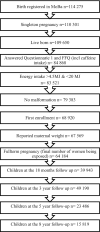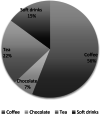Maternal caffeine intake during pregnancy and child neurodevelopment up to eight years of age-Results from the Norwegian Mother, Father and Child Cohort Study
- PMID: 32458158
- PMCID: PMC7900051
- DOI: 10.1007/s00394-020-02280-7
Maternal caffeine intake during pregnancy and child neurodevelopment up to eight years of age-Results from the Norwegian Mother, Father and Child Cohort Study
Abstract
Purpose: Current knowledge of the effect of prenatal caffeine exposure on the child's neurodevelopment is contradictory. The current study aimed to study whether caffeine intake during pregnancy was associated with impaired child neurodevelopment up to 8 years of age.
Method: A total of 64,189 full term pregnancies from the Norwegian Mother, Father and Child Cohort Study were included. A validated food-frequency questionnaire administered at gestational week 22 was used to obtain information on maternal caffeine intake from different sources. To assess child neurodevelopment (behaviour, temperament, motor development, language difficulties) validated scales were used to identify difficulties within each domain at 6, 18, 36 months as well as 5 and 8 years of age. Adjusted logistic regression models and mixed linear models were used to evaluate neurodevelopmental problems associated with maternal caffeine intake.
Results: Prenatal caffeine exposure was not associated with a persistently increased risk for behaviour, temperament, motor or language problems in children born at full-term. Results were consistent throughout all follow-ups and for different sources of caffeine intake. There was a minor trend towards an association between consumption of caffeinated soft drinks and high activity level, but this association was not driven by caffeine.
Conclusion: Low to moderate caffeine consumption during pregnancy was not associated with any persistent adverse effects concerning the child's neurodevelopment up to 8 years of age. However, a few previous studies indicate an association between high caffeine consumption and negative neurodevelopment outcomes.
Keywords: Child neurodevelopment; Maternal caffeine intake; MoBa; The Norwegian Mother, Father and Child Cohort Study.
Conflict of interest statement
On behalf of all authors, the corresponding author states that there is no conflict of interest.
Figures


Similar articles
-
Intake of Caffeinated Soft Drinks before and during Pregnancy, but Not Total Caffeine Intake, Is Associated with Increased Cerebral Palsy Risk in the Norwegian Mother and Child Cohort Study.J Nutr. 2016 Sep;146(9):1701-6. doi: 10.3945/jn.116.232272. Epub 2016 Aug 3. J Nutr. 2016. PMID: 27489007 Free PMC article.
-
Maternal dietary exposure to dioxins and polychlorinated biphenyls (PCBs) is associated with language delay in 3year old Norwegian children.Environ Int. 2016 May;91:180-7. doi: 10.1016/j.envint.2016.02.031. Epub 2016 Mar 9. Environ Int. 2016. PMID: 26970589
-
Maternal caffeine intake during pregnancy and childhood growth and overweight: results from a large Norwegian prospective observational cohort study.BMJ Open. 2018 Apr 23;8(3):e018895. doi: 10.1136/bmjopen-2017-018895. BMJ Open. 2018. PMID: 29685923 Free PMC article.
-
Association of sweetened carbonated beverage consumption during pregnancy and ADHD symptoms in the offspring: a study from the Norwegian Mother, Father and Child Cohort Study (MoBa).Eur J Nutr. 2022 Jun;61(4):2153-2166. doi: 10.1007/s00394-022-02798-y. Epub 2022 Jan 23. Eur J Nutr. 2022. PMID: 35066701 Free PMC article.
-
Association of maternal caffeine intake during pregnancy with low birth weight, childhood overweight, and obesity: a meta-analysis of cohort studies.Int J Obes (Lond). 2021 Feb;45(2):279-287. doi: 10.1038/s41366-020-0617-4. Epub 2020 Jun 9. Int J Obes (Lond). 2021. PMID: 32518355 Review.
Cited by
-
Mendelian randomization analysis of maternal coffee consumption during pregnancy on offspring neurodevelopmental difficulties in the Norwegian Mother, Father and Child Cohort Study (MoBa).Psychol Med. 2024 Oct 9;54(12):1-14. doi: 10.1017/S0033291724002216. Online ahead of print. Psychol Med. 2024. PMID: 39382486 Free PMC article.
-
Prenatal smoking, alcohol and caffeine exposure and maternal-reported attention deficit hyperactivity disorder symptoms in childhood: triangulation of evidence using negative control and polygenic risk score analyses.Addiction. 2022 May;117(5):1458-1471. doi: 10.1111/add.15746. Epub 2021 Dec 5. Addiction. 2022. PMID: 34791750 Free PMC article.
-
Prenatal substance exposure and child health: Understanding the role of environmental factors, genetics, and brain development.PNAS Nexus. 2024 Jan 30;3(1):pgae003. doi: 10.1093/pnasnexus/pgae003. eCollection 2024 Jan. PNAS Nexus. 2024. PMID: 38292554 Free PMC article.
-
Impact of tea and coffee consumption during pregnancy on children's cognitive development.Sci Rep. 2025 Mar 14;15(1):8832. doi: 10.1038/s41598-025-91982-1. Sci Rep. 2025. PMID: 40087371 Free PMC article.
-
Prenatal Caffeine Exposure Is Linked to Elevated Sugar Intake and BMI, Altered Reward Sensitivity, and Aberrant Insular Thickness in Adolescents: An ABCD Investigation.Nutrients. 2022 Nov 3;14(21):4643. doi: 10.3390/nu14214643. Nutrients. 2022. PMID: 36364905 Free PMC article.
References
-
- Andersson HC, Hallström H, Kihlman BA. Intake of caffeine and other methylxanthines during pregnancy and risk for adverse effects in pregnant women and their foetuses. Copenhagen: Nordic Council of Ministers; 2004.
-
- Livsmedelsverket. Livsmedel och innehåll; koffein (2015) http://www.livsmedelsverket.se/livsmedel-och-innehall/kosttillskott/amne.... Accessed 10 Jan 2016
-
- American College of Obstetricians and Gynecologists. ACOG Committee Opinion no. 462 Moderate caffeine consumption during pregnancy. Obstet Gynecol. 2010;116(2 Pt 1):467–468. - PubMed
-
- Aldridge A, Aranda JV, Neims AH. Caffeine metabolism in the newborn. Clin Pharmacol Ther. 1979;25(4):447–453. - PubMed
-
- Aldridge A, Bailey J, Neims AH. The disposition of caffeine during and after pregnancy. Semin Perinatol. 1981;5(4):310–314. - PubMed
MeSH terms
Substances
Grants and funding
LinkOut - more resources
Full Text Sources
Medical

